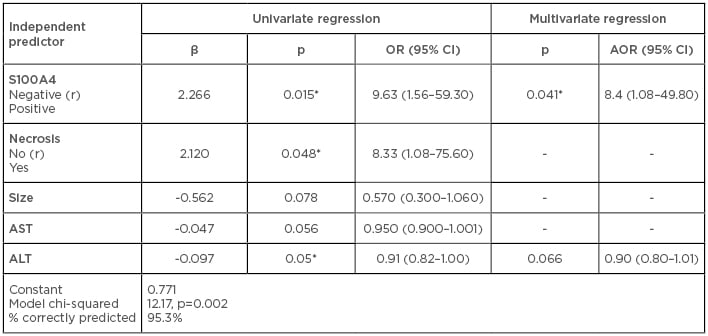The S100 protein family is a multigenic group of non-ubiquitous, cytoplasmic, EF-hand, Ca2+-binding proteins, sharing significant structural similarities at both genomic and proteomic levels.1 The S100 proteins have been reported to be implicated in the inflammatory response process, as well as in the metastatic development of several cancers.2 S100 calcium binding protein A4 (S100A4), which is related to epithelial mesenchymal transition (EMT), is mainly involved in metastasis. Hepatocellular carcinoma (HCC) cell S100A4 expression, together with other EMT-related proteins, is indicative of metastasis and informs overall survival rates.3,4 Glypicans constitute one of the two major families of heparin sulfate proteoglycans, with the other major family being syndecans.5 Glypican-3 (GPC3), which is expressed mainly during pregnancy in fetal organs regulating morphogenesis, has been shown to be active in HCC development.6 In early HCC, GPC3 is highly expressed, so it is a sensitive and specific biomarker for diagnosis, and monitoring of this protein can predict poor disease outcome.7
This study evaluated both S100A4 and GPC3 expression in primary HCC in relation to tumour aggressiveness and diagnosis. Tissues from 70 patients met the inclusion criteria for hepatectomy out of 400 cases of HCC in Egyptian cirrhotic hepatitis virus C (HCV) patients evaluated by immunohistochemistry using antibodies against SA100A4 and GPC3 on the slides of tissue microarrays and these were compared to tumour-adjacent tissue (controls).8 All patients were followed up for survival, local recurrence, and metastasis over a period of at least 6 months.
In HCC cells, GPC3 was more strongly expressed than S100A4 when both were compared to controls (79% and 21%, respectively). S100A4 was more significantly expressed in cases showing metastasis, vascular emboli, necrosis, and Grade III tumours, while no significant association with GPC3 expression was found with all these parameters. GPC3 expression was associated with the time of HCC recurrence; this correlation was not observed with S100A4 expression. The mean value of alpha-fetoprotein tumour marker was higher in both positive cases for S100A4 and GPC3, but in both S100A4 and GPC3-positive cases the overall survival time was not affected. These results indicated that S100A4 could be used as a prognostic marker for HCC progression because its expression is related to tumour metastasis, grading, and vascular invasion while GPC3 is a reliable marker of HCC diagnosis.

Table 1: Logistic regression analysis of independent predictors for metastasis.
ALT: alanine aminotransferase; AOR: adjusted odds ratio; AST: aspartate transaminase; CI: confidence interval; COR: crude odds ratio.








